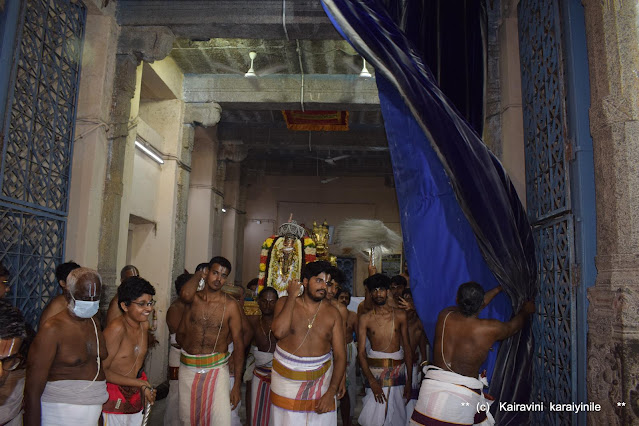Ever heard of ‘tarpan’ –nothing to do with ritual of ‘tharpanam’ though !
At Thiruvallikkeni, now the special Brahmothsavam of Sri Azhagiya Singar is on and today (9.3.2021) is day 8. ப்ரஹ்மோத்சவத்தின் எட்டாம் நாள் காலை அழகியசிங்கருக்கு ஸ்ரீலட்சுமி நாயக நரசிம்மன் திருக்கோலம். அதீத அழகு பொருந்திய சாந்த ஸ்வரூபி - தெள்ளிய சிங்கர். வடிவழகிய பெருமாள் "ஸ்ரீலக்ஷ்மி நரசிம்ஹராக' உபய நாச்சிமாருடன் அற்புத தரிசனம் அளிக்கிறார். மாலை குதிரை வாஹனம் - கலியன் வைபவம். திருமங்கை மன்னனை பெருமாள் திருத்தி ஆட்கொண்ட படலம். In the morning it was purappadu in ‘Sri Lakshmi Narasimha thirukolam’ in pallakku – late in the night it was kuthirai vahanam – the purappadu was curtailed to kulakkarai and South Mada street. Kuthirai vahana aesal occurred at South Mada street and kaliyan vaibavam too here itself due to an asantharpam that hindered Periya mada veethi purappadu.
Horses are
ungulates — mammals with hooves. They also have long tails, short hair,
muscular torsos, long thick necks and elongated heads. Due to domestication,
they are found all over the world. Horses
have lived on Earth for more than 50 million years, according the American
Museum of Natural History. The tarpan (Equus ferus ferus), also known as
the Eurasian wild horse, is an
extinct subspecies of wild horse. The last individual believed to be of this
subspecies died in captivity in the Russian Empire during 1909, although some
sources claim that it was not a genuine wild horse due to its resemblance to
domesticated horses.
Modern horses, zebras, and asses belong to the genus Equus, the only surviving genus in a once diverse family, the Equidae. Based on fossil records, the genus appears to have originated in North America about 4 million years ago and spread to Eurasia (presumably by crossing the Bering land bridge) 2 to 3 million years ago. Following that original emigration, there were additional westward migrations to Asia and return migrations back to North America, as well as several extinctions of Equus species in North America. Its closest wild ancestor may have been the tarpan, often classified as E. ferus; there is no evidence, though, that the tarpan was a different species. In any case the domesticated horse probably did not arise at a single place and time, but was bred from several wild varieties by Eurasian herders.
For Srivaishnavaites, surrendering at the lotus feet of Emperuman is the purpose of life. Today 9.3.2021 during the special Brahmothsavam for Sri Azhagiya Singar Perumal in the evening occurred purappadu in ‘Kuthirai vahanam’. Our ancestors have not only established such grand fete ‘Uthsavams’ but have taken care of the minutest details .. .. on the golden decorated horse, Emperuman cracks a whip, adorns a crown that generally is worn by warriors on horse ~ and ever imagined how His legs would be adorned ? - have darshan of Emperuman thiruvadi here !!
குதிரை- புராணங்களிலும், சங்க இலக்கியங்களிலும், மன்னர் காலத்திலும், சிறப்பாக கருதப்பட்டு வந்து உள்ளது. இளவரசர்கள் யானை ஏற்றம், குதிரை ஏற்றம், ரதம் ஓட்டுதல் இவற்றில் தேர்ச்சி அடைந்தனர். பண்டைய அரசுகளின் படைகளில் குதிரைப்படை இன்றியமையாத ஒன்றாக இருந்துள்ளது. குதிரைகள் மிக வேகமாக ஓட வல்லவை - அவற்றின் சக்தி பிரம்மிப்பூட்ட்ட வல்லது. நமது வைணவ திருக்கோவில்களில் பிரம்மோத்சவத்தில் - குதிரை வாஹனம் சிறப்பானது.
Horses domesticated
thousands of years ago, have been associated with man in many ways – right from
farming to warfare. The centuries that
immediately preceded produced a flood of
treatises on the organization and tactics of cavalry and on the training of
cavalry horses and riders. Countless public reports and private diaries,
regimental histories and personal memoirs, intensified the deluge, as did a
steady stream of disciplinary histories, particularly in the latter half of
that period. Many of these works relied not only on the military experience and
expertise of their authors, but also on disinterested research and rigorous
thinking. Cavalry has been at the
centrestage of warfare.
On day 8 of Brahmothsavam @ thiruvallikkeni is ‘Aswa (kuthirai) vahanam’ [in fact two !] – Emperuman has purappadu on golden horse and comes Thirumangai mannan on his ‘aadalma’ (more on Kaliyan vaibhavam in a separate post !) Here are some photos of kuthirai vahanam, Thirumangaimannan – kaliyan vaibhavam. This time - ‘pattolai’ usually rendered by Dr MA Venkatakrishnan Swami, was rendered by Sri MS Srinivasan [Adhyapakar Kanthadai Srinivasan swami] Here is a video taken by me :
Mamandur Veeravalli Srinivasan Sampathkumar
09.03.2021

























No comments:
Post a Comment